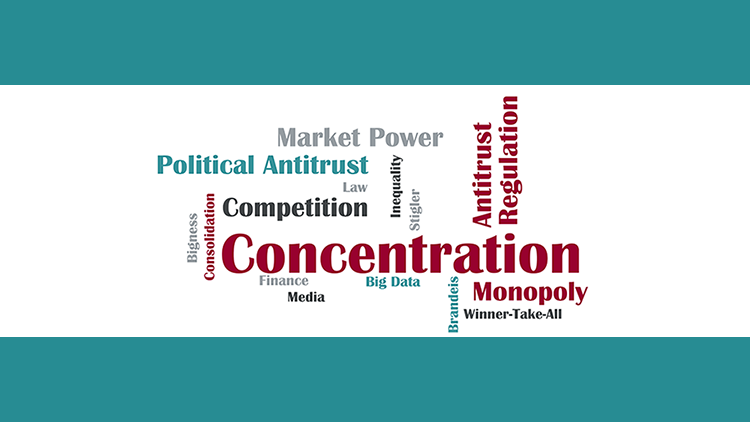In this installment of ProMarket’s interview series on concentration in America, Gerald Berk from the University of Oregon discusses the political implications of concentration.
Does America have a concentration problem? On March 27-29, the Stigler Center hosted a first-of-its-kind, three-day conference in Chicago that focused on this very question.
The conference brought together dozens of top academics from law, economics, history, and political science, policymakers, journalists, and public intellectuals. Ahead of this conference, we presented influential scholars and thinkers with some questions on concentration, market power, and bigness—and their potential effects on the U.S. economy.
You can read all previous installments here.

Gerald Berk is a professor of political science at the University of Oregon whose work deals with the history of regulation in the United States. He is the author of the books Alternative Tracks: The Constitution of American Industrial Order, 1870-1917 (Johns Hopkins University Press, 1994), which received the American Political Science Association’s J. David Greenstone Award for the Best Book in Politics and History, and Louis D. Brandeis and the Making of Regulated Competition, 1900-1930 (Cambridge University Press, 2009).
Berk is currently at work on two projects. The first rethinks institutions as sites of ongoing creative recomposition—the subject the book Political Creativity: Reconfiguring Institutional Order and Change (University of Pennsylvania Press, 2013), which he co-edited. The second, research for which was funded by the National Endowment for the Humanities, is a study of systems analysis in American government from World War II through the War on Poverty, entitled Improvising Rationality in the Cold War State.
In a brief interview with ProMarket, Berk shared some thought on the political implications of concentration in the U.S.
Q: The discourse on concentration, market power, and bigness in many U.S. industries has increased dramatically in the last year. Do you believe that we have enough empirical evidence to show that concentration is on the rise and having adverse effects on the economy?
Yes, especially in banking and retail. In banking, a long process of consolidation and intrasectoral integration since the crisis of the Savings and Loan industry in the 1980s and 1990s has produced a far more concentrated and inter-linked industry. This process was deepened and extended by state sponsored mergers in the Long Term Capital and Subprime crises through state-sponsored mergers and bailouts. While bailouts were a temporary fix, they advanced concentration by giving the largest institutions advantages in borrowing and lending.
Tight linkages between far-flung parts of the industry decreases safety as formerly local crises tend to spread. And concentration tends to squeeze out small & local borrowers. In retail, studies of Wal-Mart demonstrate widespread monopsony power, which often drives down product quality and safety; while large on-line retailers, like Amazon, use predatory pricing, deferred profits, and unequal access to financial markets to drive specialized competitors to the wall. Like banking, concentration and predatory competition in retail tends to drive down product standards, safety, and the quality of service. It also drives down labor standards.
Q: In your opinion, what are the main reasons for the rise in concentration?
While the proximate causes of concentration are economic motives for monopoly rents and government deregulation (e.g., the suspension of antitrust), as an historical institutionalist political scientist and economic sociologist, I see the deeper causes as ideational, cognitive and coalitional. In response to the economic crisis of the 1970s, a coalition of academic lawyers and economists, state officials, bankers, and managers rethought the relationship between finance, competition and the state. Together, they produced a loosely coordinated, yet common institutional project, which subordinated production to trade and finance.
Concentration, in that project, has served diverse purposes for the members of this coalition. For government regulators, it provided a logic for American competitiveness. For retailers, it has provided an instrument to take transactional rents. And for bankers, it has expanded access to tradable assets, by creating what the sociologist Gerald Davis calls the “portfolio society.”
Q: Which industries should we be concerned with when we look at questions of concentration?
Banking, retail, media, and high tech. I know less about the so-called “sharing economy” sectors, like Uber and AirBnB, but these sectors appear to be using similar predatory tactics to the ones that have resulted in concentration in other industries.
Q: Has consolidation in the financial industry played a role in concentration or antitrust issues in the U.S.?
My answers to [questions] 1 and 2 begin to address this question, where I indicate that the financialization of the U.S. economy has produced mechanisms that lead toward concentration in finance and other sectors. However, financialization has had multiple and often contradictory effects on concentration.
By shifting the logic of corporate management from production to finance, which is documented so well by the work of H. Thomas Johnson, it made it possible to see all corporate property as tradable assets. This meant both concentration and de-concentration of American industry, as success was measured by the revenues generated by asset transactions rather than sales of products and industrial firms turned their attention to financial transactions and mergers and acquisitions instead of research and development.
Q: The five largest internet and tech companies—Apple, Google, Amazon, Facebook, and Microsoft—have outstanding market share in their markets. Are current antitrust policies and theories able to deal with the potential problems that arise from the dominant positions of these companies and the vast data they collect on users?
No. I believe that current policies overemphasize monopolization in single markets and do little to get at the sorts of predatory tactics firms that firms can deploy by their simultaneous presence in multiple markets.
Q: Is there a connection between the growing inequality in the U.S. and concentration, dominant firms, and winner-take-all markets?
Yes. There is a direct relationship between monopsony power in some labor markets and low wages, under-employment, sporadic hours, poor working conditions, and anti-union activity. Wal-Mart is the most obvious case, which has been documented by a number of studies. But there is also an indirect mechanism between financialization, concentration, and inequality that is currently being documented and analyzed by sociologists and political scientists.
Studies have begun to show that high income earners in concentrated sectors, like finance, high tech, and retail, are far less likely to support transfer payments through government than the rest of us. Increasingly, they work longer hours in lucrative, though precarious, jobs, which lead them perceive the underemployed and working poor as fundamentally different from themselves and less deserving.
Q: President Trump has signaled before and after the election that he may block mergers and go after certain dominant companies. What kind of antitrust policies should we expect from him? Pro-business, pro-competition, or political antitrust?
Early signs show that antitrust policy under Trump will be more of the same—mostly hands off of large scale mergers and acquisitions and little in the way of investigating or prosecuting structural power and predatory practices. Although this perspective has been cast as pro-competitive, in my view, it’s anything but.
That said, Trump’s style would predict political antitrust. That is, backroom threats of antitrust prosecution will be one among many of the carrots and sticks the Trump administration will use to negotiate highly visible business investments, which will be used to augment the Trump “political brand.” It may be that a few highly visible antitrust cases will be necessary in order to augment the power of the presidency in these negotiations by making threats credible. This is not unlike the way Teddy Roosevelt used “trust busting.”






